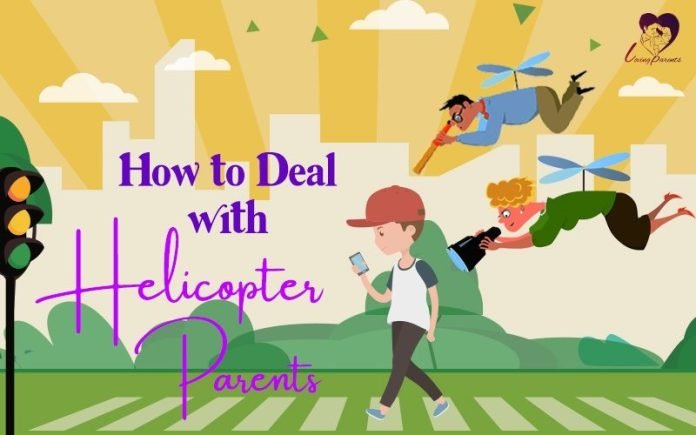We all are striving out there to be the best parents to our children. But there can be times when we are not parenting but over-parenting. Some of you might be wondering if you have helicopter parents or not, and how to deal with helicopter parents? Well, read on to find out.
What is Helicopter Parenting?
Helicopter parenting, in the simplest sense, is ‘over-parenting.’ When a parent is involved extensively in a child’s life that they over-control and over-perfect their life experiences, successes and failures, it is called helicopter parenting.
Who is a Helicopter Parent?

When a parent is being over-responsible for everything that their child does and helps them do the tasks that they are capable of doing, he/she is being a helicopter parent.
Have you ever come across a parent in high school or college who would constantly call the teachers to talk about the grades of their kid or they would be over-involved in the scheduling of classes or they’ll keep on hovering over their child even while they exercise? Well, you have met a helicopter parent.
Helicopter parenting is not only restricted to parents controlling or helping their child do tasks in high school or college. This can also be observed from a much earlier stage of a child being a toddler. I met a kindergarten mom in my child’s class who would be there for every PTA meeting, and get involved in every activity that was planned by the class teacher. She was the one who would constantly send updates and ask several questions a day in our WhatsApp group for the class. She even selected the friends her child would play with and orchestrated play dates. I was thankful for not taking my child on a play date with hers, ever.
Also Read: Weak Parenting Skills Everyone Should Avoid
Why do parents hover?
There can be several reasons why a parent would constantly hover over his/her child. Some of those could be:
1. Fear of dire consequences
Many times, parents fear that not getting selected for the sports team or botching an interview could cause unhappiness in a child. They start over-parenting as they fear that these dire consequences. But as per several child psychologists, a child needs to experience every emotion. Being unhappy, unsuccessful, not getting selected for a play or a sports team or not acing an exam is what a child might need to push forward and excel. Experiencing and understanding all of these emotions of being happy, sad, upset, angry is an important part of development and growth for a child.

2. Overcompensation
Parents who never felt loved or protected or had an attention-deficient childhood can get over-involved in their child to compensate for the emotional hole that was left behind by their own parents.
3. Anxiety
As parents, they have more experience of the job market, economy and what it might take to excel in the school or college which pushes them to take more control of their children’s lives.
4. Guilt & Peer Pressure
So, I had been a working professional all my life, and I am quite an involved mother as well. But whenever I saw an over-involved parent being all apprised about every tiny detail or being involved in every activity, I would always overcome with the guilt of not being more involved in the lives of my children. What would happen next would be me smothering my children every second of the day. I would ask them several questions about their school, friends, nit-pick their every choice and start putting restriction even where they are unnecessary.
Also Read: Instead of Grounding your kid, steps to teach a lesson
What are the negative effects of Helicopter parenting?
There is a fine line between being engaged in your children’s lives and controlling their lives. Having an engaged parent has immense benefits for children. They feel loved and accepted and have high self-esteem. But when our decisions to parent come from a place of fear, it can lead to several developmental issues in our children.

1. Low Self-Esteem and Confidence
Children who have over-involved parents can go through low self-esteem and confidence as they feel that their parents don’t trust them to do a task by themselves.
2. Underdeveloped Coping Skills
If a parent is always there to prevent the problem or clean up the mess of their children, how are they ever going to learn how to cope with loss, disappointment and failure? All of these experiences are necessary to develop coping skills and resilience in a child. What if a situation arises when a parent isn’t there to help them through an issue? Would the children be able to cope well with the situation?
3. Underdeveloped Life Skills
Studies have shown that children with helicopter parents have a hard time transitioning from home life to real life. If a parent has been taking care of all the tasks at home, how are the children ever going to learn and master skills like cleaning, laundry, packing lunches etc.
4. Sense of Entitlement
When a parent intervenes in a child’s life and provides for everything he/she desires, the children start feeling a sense of entitlement. They feel that everything has to be their way.
How to Deal with Helicopter Parents?
Well, I have been on both sides of the fences. My parents have hovered over me and I have over-parented my children several times, well as many times as I was or would be struck with guilt. So, if you are a teacher or a kid and have been trying to find ways of dealing with helicopter parents, here’s how you can go about it:

1. Understand their motivations
As mentioned earlier, many parents overcompensate and get over-involved because of fear or anxiety or their own childhood experiences. Understanding them and helping them realize this could be the first step about how to deal with helicopter parents.
2. Teach them the effects of helicopter parenting
A parent is only going to listen to you if you explain to them the negative effects of them constantly hovering over you. Tell them how important it is psychologically to experiences all the emotions and experiences to learn and develop important coping and life skills.
3. Communicate clearly with them
If you are a teacher, you can start by assuring them that they would receive constant updates from you at the start of the school year itself. This can help put their anxious minds to ease. Also, it is a good idea to establish boundaries with them or otherwise you will keep getting interrupting phone calls at all the times. Make sure that whatever documents are to be signed are sent and received through the student itself. You can tell them to leave their queries in the WhatsApp / Text group where sometimes, these queries could get answered by other parents as well.
The Take-Away
Dealing with helicopter parents might not be easy and even have some consequences. No parent is ready to listen when you tell them that they are being over-engaged and over-controlling in their child’s life. The only way about how to deal with helicopter parents is to tell them how it would negatively affect the development of their child.

